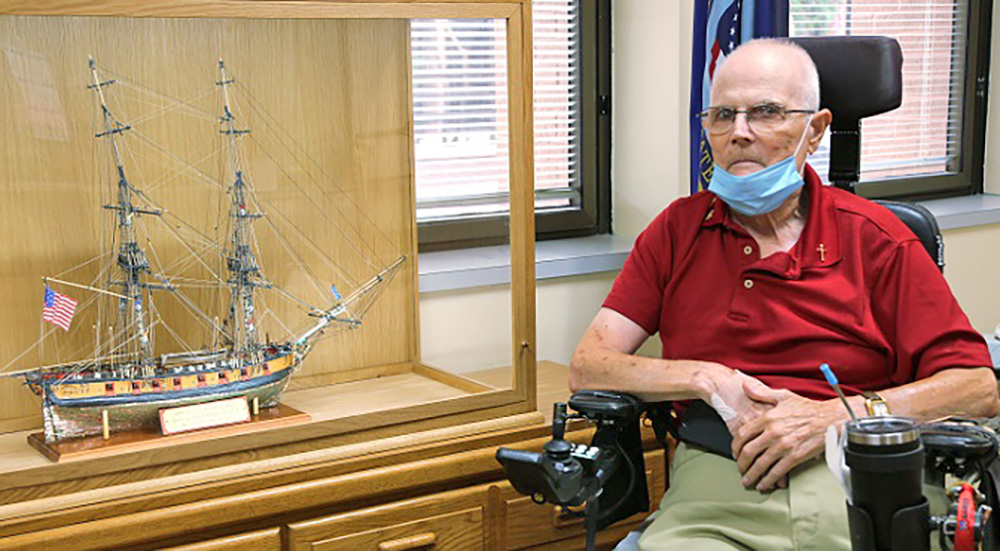As you enter the Spinal Cord Injury and Disorder (SCI/D) clinic at the Audie L. Murphy Memorial VA, you are greeted by a wooden replica of the U.S.S. Syren.
The model was built and donated by Army Veteran John Bemben (pictured above). He spent over two years on the build. It took a few additional years to get the model in the SCI/D lobby. “I was trying to do this for five years and hoping that just one person sees it,” Bemben said.
Bemben’s physician and Chief of SCI/D Dr. Divya Singhal responded to a request from him to bring a model into the hospital. He has been a patient at South Texas VA and the SCI/D clinic for 20 years and his history with modeling is almost as long and storied as the ship itself.
Bemben has been modeling for 50 years and has finished six models in the last 15 years. In addition to a broken neck, he also suffers from Multiple Sclerosis, which he says saps a bit of his energy. “It doesn’t interfere with my modeling. When I get tired, I just know it is time for me to step away from it,” he said.
Hobbies reduce stress and depression
There are several other completed kits on display at SCI/D. The kits are just one of the activities the expanded recreation therapy program offers patients. In an SCI environment, recreational activities play an important role for physical and cognitive benefits.
“Veterans who recreate can look forward to reducing depression, stress and anxiety, in addition to improving basic motor functioning and fine motor skills when participating in meaningful activities and hobbies, such as model building, painting, etc.,” said Erin Dixon, chief of Recreation Therapy Service.
Bemben echoed those sentiments. “Modeling helps with everything. It helps my hands, my motor skills and makes me think about what I’m doing,” he added.
“I needed something better to do.”
Maintaining cognitive abilities is what keeps Bemben moving forward. He admits he wasn’t always so positive when he first became quadriplegic. “Sixteen years went by and all I was doing was watching old movies, and I needed something better to do, so I built ships,” he said. “You have to have a reason to live.”
A research study conducted by the Mayo Clinic found participants who engaged in artistic hobbies such as painting, drawing or sculpture in both middle and old age were 73 percent less likely to develop mild cognitive impairment than those who didn’t. Those who crafted—doing things like pottery, woodworking, quilting or sewing—were 45 percent less likely to develop mild cognitive impairment.
Bemben also spends time mentoring other SCI/D patients. As an inside joke between patient and provider, mentoring is part of Bemben’s official duties as “Associate of patient care.” He takes this charge seriously. “If I can help anybody, help them in the chair, you got it,” he said.
The power of peer support
One common theme that Singhal hears is that, when it comes from a Veteran who is in a similar situation, it is invaluable to them. Singhal tapped into the power of that peer support and asked Bemben to mentor a few newer spinal cord patients who were having difficulties transitioning.
“I understood where he was. I feel like I made a difference. When the person telling you what to expect has been there, it’s different than hearing it from a doctor,” Bemben said.
To read more stories on VA’s diagnosis and treatment of spinal cord injuries, visit VA News and Information.
Topics in this story
More Stories
Veteran Byron Potier weighed almost 300 pounds and was tired and lethargic. He was the perfect candidate for gastric sleeve surgery.
How much do you know about VA care, benefits and services? Don’t miss out on what you've earned—check out the "2025 VA Federal Benefits Guide for Veterans, Dependents, Survivors, and Caregivers" handbook to learn more.
Feeling stressed? Your breath can help you relax and focus. Take 3 minutes to reset and prioritize your well being for this week's #LiveWholeHealth practice.







After my wife passed away, I was sliding in the deep, depression and grief with also a loss of my job. I started singing country music is therapy.
Deepest condolences to you Steve. I’m glad that singing country music is providing you an improved quality of life. Do you sing for others?
Does VA SCI/D have an electronic newsletter for Veterans?
Let me find that out for you sir
Did not see any newsletters per se, but there is a lot of information here on the National SCI page. https://www.sci.va.gov/index.asp